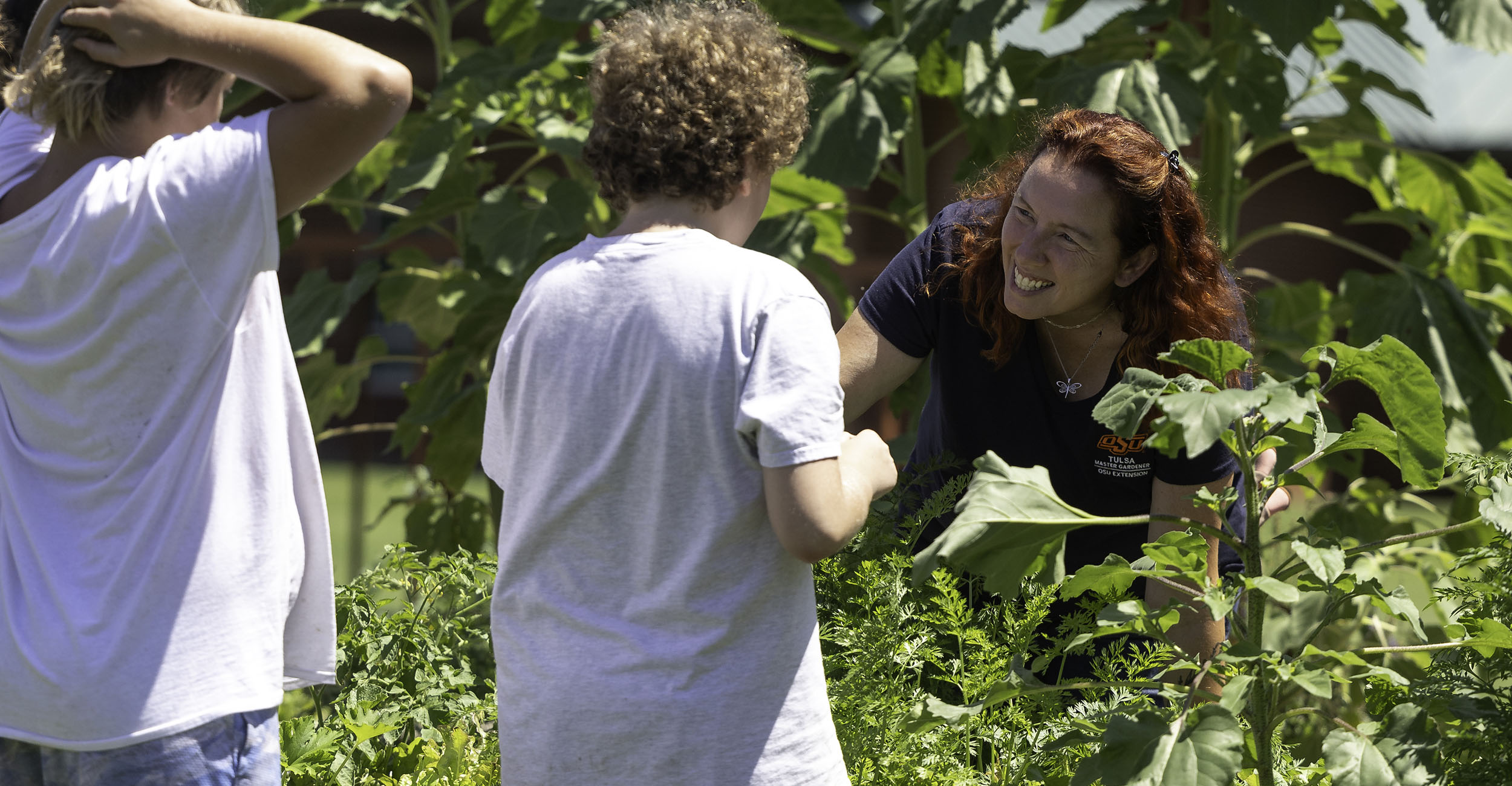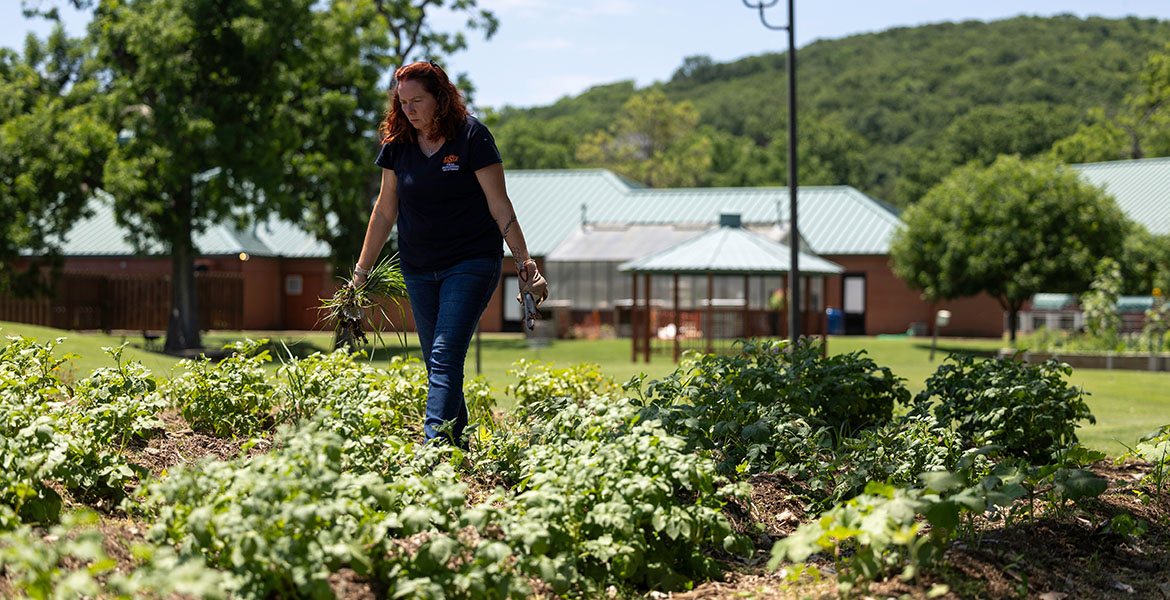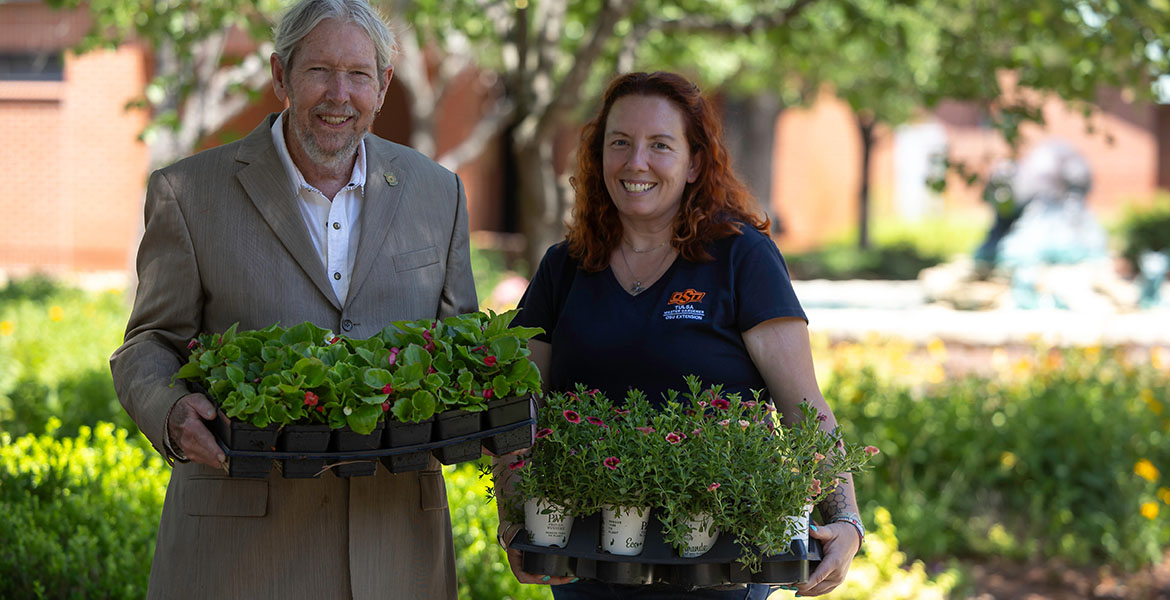
Master Gardeners plant seeds for the future at Tulsa Boys’ Home
Tuesday, June 18, 2024
Media Contact: Trisha Gedon | Sr. Communications Specialist | 405-744-3625 | trisha.gedon@okstate.edu
A gardening endeavor spearheaded by the Oklahoma State University Extension Tulsa County Master Gardeners program provides residents at the Tulsa Boys’ Home with skills they can use throughout their lives.
Brian Jervis, Oklahoma State University Extension horticulture and 4-H youth development educator in Tulsa County, had been looking for an organization to involve Tulsa County Master Gardeners. When the group took part in a Hope Tour at the Tulsa Boys’ Home in Sand Springs, Oklahoma, in January 2023, he found what he was looking for and identified Master Gardener Danielle Adkins to take on the challenge of establishing a gardening program.
What started with building a few raised vegetable garden beds in April 2023 has evolved today into something bigger than anyone imagined. In the summer of 2023, Adkins began teaching a gardening class five days a week as part of the boys’ required educational curriculum. She also leads a voluntary gardening club the boys may participate in provided they maintain their grades and demonstrate good behavior. The club is so popular it has a waiting list.
With regular assistance from 25 to 30 Tulsa County Master Gardeners and the home’s 62 residents, the campus now features lush flower beds and productive vegetable gardens. Joe Schulte, owner of Southwood Landscape and Garden Center in Tulsa, has been instrumental in providing garden plants for the effort. The Tulsa Master Gardeners group provides the vegetable plants.
Jervis said he had high hopes for the project.
“I knew it would take someone like Danielle to take this and run, and it has been very successful,” Jervis said. “I also knew it would be valuable for the boys, but I didn’t know how valuable it would be. They get right in there and help with all aspects of gardening, and they love it.”
Adkins, who has been a Tulsa Master Gardener since 2018, admitted that some boys were less than enthusiastic initially.
“They thought gardening was for girls or for old people, but it wasn’t long before they were taking ownership in what we were doing,” Adkins said. “I broke it down for them with real-world examples. If they wanted to become a chef, they’d need to know how to choose the freshest produce. Because we are measuring lumber when we build beds, I explained this is a skill they’d need to be an architect or construction worker. What we do with gardening connects with everything they’re learning in their other classes. They’re using critical thinking skills.”

Gardening lessons don’t stop in the off-season. Adkins said she incorporates all aspects of education into her classes.
“We’ve learned how people from around the world have gardened and learned how to grow what they grow. Then we make a dish from those cultures,” she said. “We look at seed magazines in the off-season, and we talk about garden plans and draw gardens to scale.”
The boys made lip balm with bees’ wax obtained from beehives at John 3:16 Mission in Tulsa, along with other natural ingredients. They’ve also learned how to make lotions and salsa. They’ll grow mums to sell in the fall, and the proceeds will be invested into their gardening curriculum.
“Gardening really helps me rest my brain and learn some amazing things,” said one resident. “I never thought I’d get a chance to do this kind of stuff, and I’m learning hobbies I’ll carry on the rest of my life.”
Another resident said he plans to use the skills and knowledge he has obtained when he has his own home.
“We learn stuff here that other kids don’t get to learn,” he said. “We’re learning to become adults and gaining a lot of independent living skills.”
Greg Conway, executive director and CEO of the nationally accredited Tulsa Boys’ Home, said he developed the Hope Tours as a way for the public to learn more about the operation and purpose of the home, and that effort has paid off.
“A lot of people don’t fully understand what we do here. These tours are a way for the public and groups such as the Master Gardeners to learn more about us,” Conway said. “Through the tour in January 2023, we’ve developed this wonderful partnership that is beneficial to everyone involved. Danielle and what we call her posse are here every day sharing their knowledge with the boys, and they have breathed new life into this whole horticultural and gardening piece of the puzzle. Danielle connects with the boys and we build on that each day.”

Once Master Gardeners were involved, the home’s greenhouse became more fully utilized, and the site’s gardens, installed to encourage healing, took on a more robust, colorful glow.
“Now our campus has the wow factor,” Conway said. “We want the best and the brightest working with our boys, and we have that.”
Conway said the boys helped build the raised beds and have grown sweet potatoes, tomatoes, zucchini and other vegetables. They eat lunch and dinner together five days a week in the main kitchen where some of the garden harvest is prepared for cooking. The boys also take some of the vegetables back to their lodges for breakfasts and weekend meals.
“They’re prideful in the fact that they helped grow the food that’s on the table because they were involved with the production from seed to the table,” Conway said. “They enjoy the fruits of their labor. Some of the boys didn’t like vegetables, but now they’re picking a cucumber and eating it right off the vine. They’ve made the connection of where their food comes from.”
Jervis said the project aligns perfectly with the Master Gardener mission and is one of the most rewarding projects he has implemented in his 22-year Extension career.
“Our mission is to share our love of gardening with others, and we’re giving the boys an opportunity to learn new things,” Jervis said. “Showing these boys that there’s more to life, that they can enjoy gardening and it’s therapeutic is a win-win for everyone involved.”
Conway said he is grateful for how the Hope Tour in 2023 initiated such a meaningful partnership.
“Danielle, Brian and the Master Gardeners have been a tremendous gift and blessing to the Tulsa Boys’ Home,” he said. “They’ve helped the boys develop a skillset they can take when they leave here.”
The Tulsa Boys’ Home was founded in 1918 and is the largest residential treatment facility serving troubled boys in Oklahoma. The facility currently houses 50 residents between the ages of 13 and 18 who have been placed by the Department of Human Services, and another 12 boys who are privately placed by parents or legal guardians. The mission of the Tulsa Boys’ Home is to provide the highest quality of residential care for boys needing placement outside their homes for the purpose of developing well-adjusted, responsible adults and strengthening the family. Visit the Tulsa Boys’ Home website to learn more.
